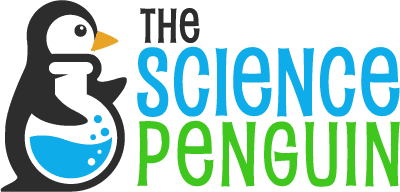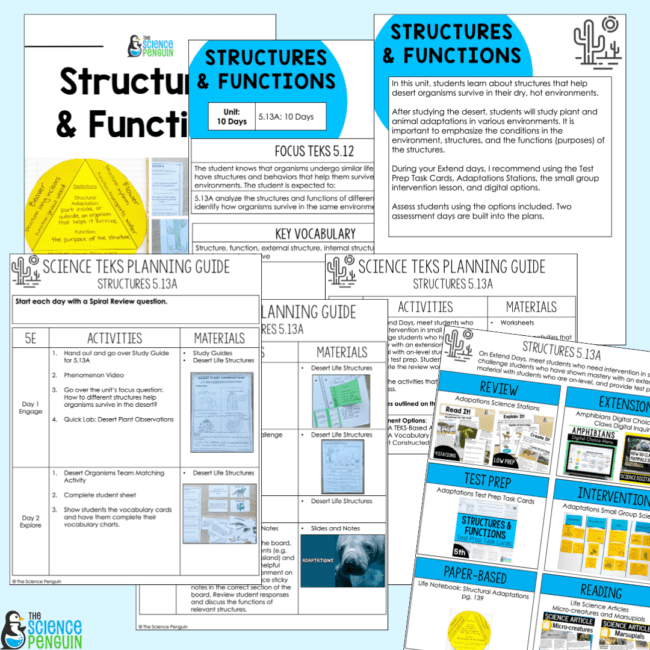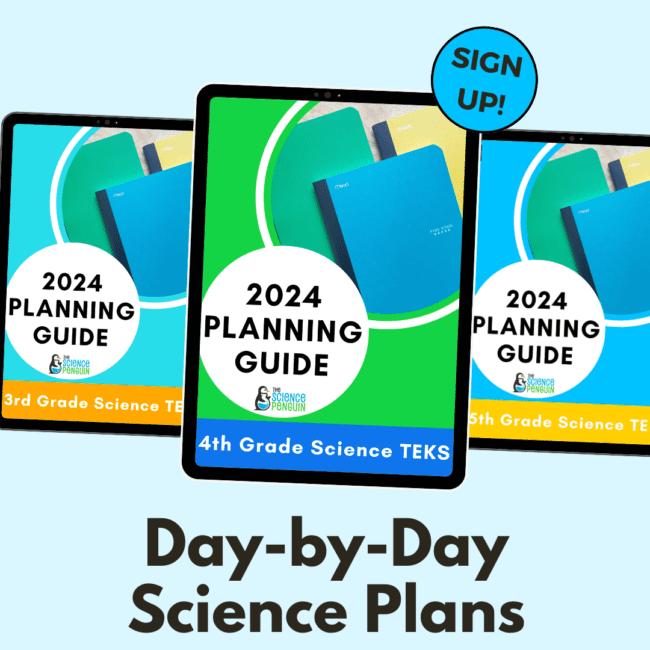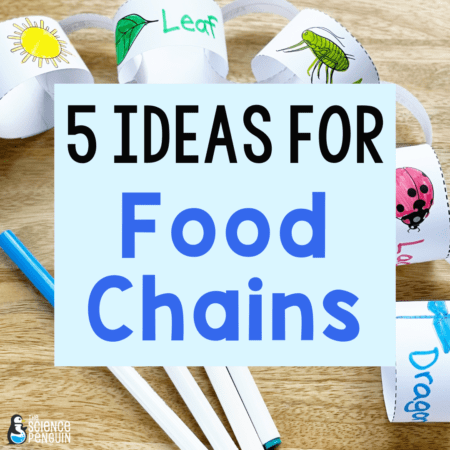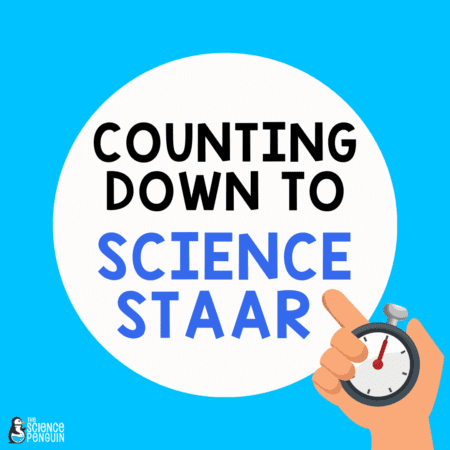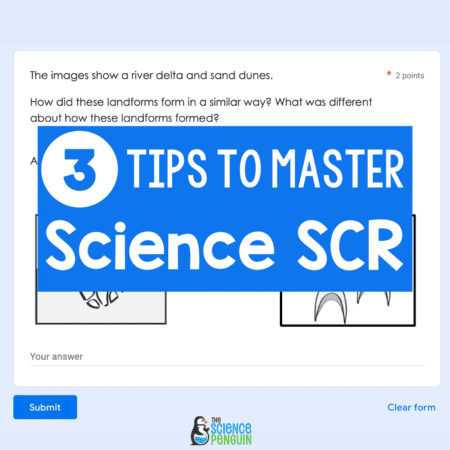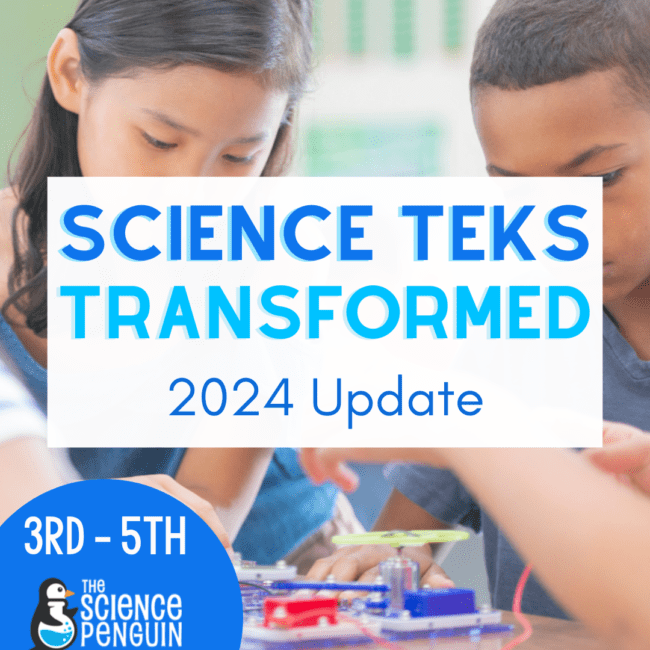
As always, we've got you covered !
Implementation of the new science TEKS begins in August 2024.
The Science Penguin worked for over a year to ensure our materials for 3rd, 4th, and 5th grade TEKS are updated and fully aligned.
Spiral reviews, assessments, and STAAR materials were updated. We created new units with phenomena and engineering in mind. Our product testers (Texas teachers!) rave about the new materials. I can’t wait for you to see the updates!
Check out the bite-sized summaries below to get the basics of the content of the new science TEKS.
Matter: Students understand that matter has measurable physical properties. They learn to measure, test, and record these properties, and explore changes in the state of matter caused by heating or cooling. Say goodbye to mixtures and hello to combining materials based on their physical properties to serve a purpose.
Force, Motion, and Energy: Students learn about the nature of forces and their interactions, including magnetism, gravity, pushes, and pulls. They plan and conduct investigations demonstrating how forces can change position and motion. They also identify everyday examples of energy and understand the relationship between speed and mechanical energy.
Space: Students understand the patterns and objects in Earth’s solar system. They construct models of the Sun, Earth, and Moon’s orbits and identify the order of the planets. We no longer study the Sun as its own SE.
Earth: They still study the rapid processes that change Earth over time and natural resources. We go a little deeper into natural resources.
Weather and Soil Formation: Students compare and describe day-to-day weather in different locations and investigate how soils such as sand and clay are formed.
Environments: Students understand how changes in a food chain affect the ecosystem, how natural environmental changes affect organisms. They will now learn how temperature and precipitation affect animal and plant behaviors, and receive an introduction to fossils. We no longer focus on how physical characteristics of an environment affect the life there.
Structures and Life Cycles: Students explore how external structures and functions of animals help them survive and compare life cycles in different organisms. Structures and functions of plants was moved to 4th.
Matter and Energy: Students classify and describe matter based on observable physical properties. They investigate and compare a variety of mixtures, now demonstrating that matter is conserved when these mixtures are formed. Volume is no longer a focus of 4th grade.
Force, Motion, and Energy: Students explore the nature of forces and their patterns. They plan and conduct investigations to understand the patterns of forces. They also study energy transfer and the differences between conductors and insulators of thermal and electrical energy. Also, wave hello to waves.
Circuits: No more buzzers– students are investigating circuits that produce light and thermal energy.
Space: Students recognize patterns among the Sun, Earth, and Moon system and their effects. They collect and analyze data to identify sequences and predict patterns of changes in seasons and the appearance of the Moon. Farewell to shadows!
Earth’s Processes and Patterns of Change: Students learn about the continuous movement of water through the water cycle and the role of the Sun in this process. They model slow changes to Earth’s surface caused by weathering, erosion, and deposition, and understand the difference between weather and climate.
Natural Resources: Students understand the importance of Earth’s renewable and nonrenewable natural resources and their advantages and disadvantages. They learn about the critical role of energy resources and the environmental impacts of conservation, disposal, and recycling. Adios soil and welcome rocks!
Organisms and Environments: Students investigate how producers make their own food by cycling matter. They learn about the cycling of matter and flow of energy through food webs and identify past environments based on fossil evidence.
Survival Structures and Functions in Plants: Students explore and explain how the structures and functions of plants, like waxy leaves and deep roots, enable them to survive in their environments. Animal structures are studied in third grade now.
Inherited and Acquired Traits: Students learn to differentiate between inherited and acquired physical traits of organisms. Learned behaviors are addressed in fifth grade now. Life cycles are gone.
Matter and Energy: Students compare and contrast matter based on its physical properties. They explore how some mixtures maintain their individual properties, the conservation of matter when solutions are created, and they illustrate how matter is made up of particles too small to see.
Force and Motion: Students investigate the effects of equal and unequal forces on motion and energy transfer, and design experiments to test the impact of force on objects within systems.
Energy Transformation: Students investigate energy transformation in systems. Electrical circuits and the properties of light are mostly the same. Uses of MELTS energy is gone.
Space: Students understand the Earth’s rotation and how it causes day/night cycles and changes in shadow positions and shapes.
Water: They learn about the interaction between the Sun and the ocean in the water cycle and how it affects weather. Weather vs. climate is now in 4th grade.
Earth’s Processes: Students still model the processes that lead to the formation of sedimentary rocks and fossil fuels, and changes to Earth’s surface by wind, water, or ice that result in different landforms.
Natural Resources: Welcome back, natural resources! Students design and explain solutions to minimize environmental impacts of using natural resources through conservation, recycling, or proper disposal.
Organisms and Environments: Much of this is the same. Students observe how organisms survive by interacting with biotic and abiotic factors in a healthy ecosystem. They predict how changes in an ecosystem affect the cycling of matter and energy flow, and they understand how human activities can impact an ecosystem. Say goodbye to fossils and past environments.
Survival Structures and Behaviors in Organisms: Students analyze the structures and functions of different species to understand how organisms survive in the same environment. The focus is on instinctual and learned behavioral traits that increase chances of survival. Physical traits is now in 4th grade.
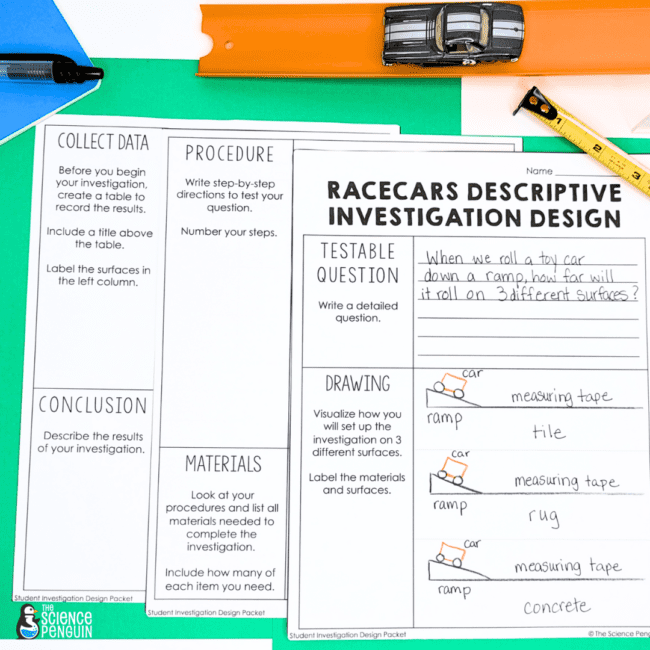
Did everything change ?
Not really! As shown above, a lot of the content in the Student Expectations will stay the same or vary just slightly. Here are some examples:
In 3rd grade, we have a stronger focus on natural resources and will add in properties of materials, fossils, and organism responses to seasonal change.
In 4th grade, we’ll add a focus on plants, weather and climate, fossils, energy transfer, conservation of matter, and acquired vs. inherited traits rather than dealing with learned behaviors or instincts. Say goodbye to soil, life cycles, and shadows.
In 5th grade, we will add the conservation of matter, natural resources, particles of matter, and unbalanced vs. balanced forces. Rather than uses of energy, the focus is on the transformation of energy. Weather and climate and fossils were moved to 4th grade.
Some SEs have been moved around to different grade levels. 3rd grade is mostly the same content. 4th and 5th grade content vary a bit and had changes in language or focus.
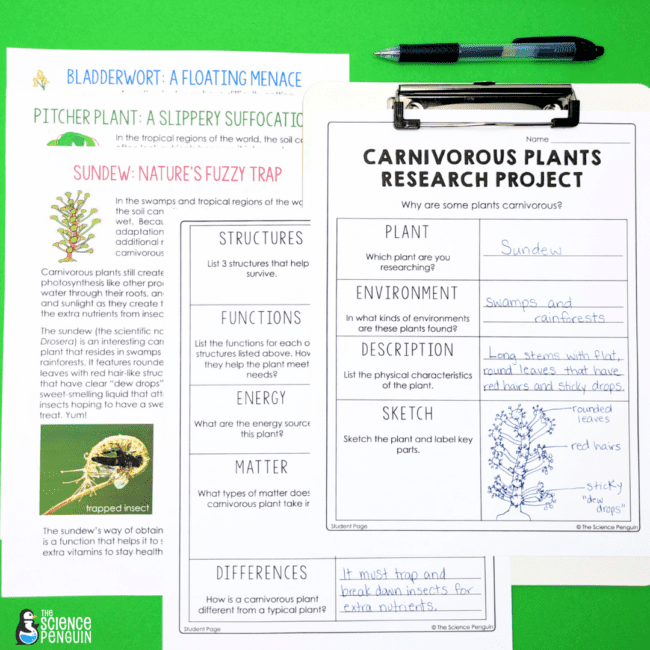
How is instruction different?
This is where things get a little more complicated. Instruction is going to take on a fresh new look. 🥸
Hello, engineering! The engineering projects are TEKS-aligned and relevant to the content SEs. Students will be designing solutions in no time!
Hello, phenomena! With a new phenomenon-based unit structure, these TEKS-aligned units center around a central question. Throughout a 5-day journey, classes use the 5E model to answer questions with solid claims backed by evidence and reasoning. Hands-on investigations, notebooking, and model-building take center stage along the way.
Hello, recurring themes and concepts! These themes occur at all grade levels and are embedded throughout your science curriculum. Students will look at patterns, determine cause and effect, and understand systems and change.
If you’re thinking, “Wow, I hope there are some cool new acronyms to use,” you’re in luck. 😉 Let’s take a quick look at SEP and RTC!
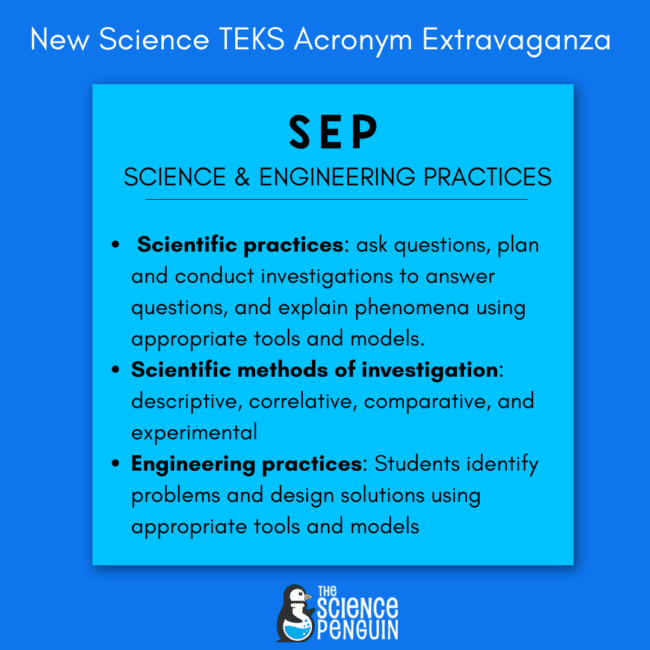
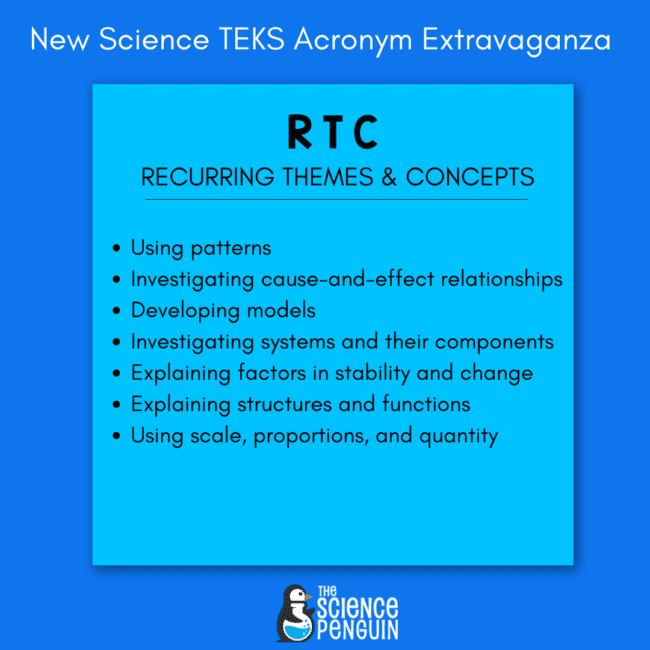
Alignment Charts
Here is a look at how Science Penguin resources stack up with SEP and RTC.
3rd Grade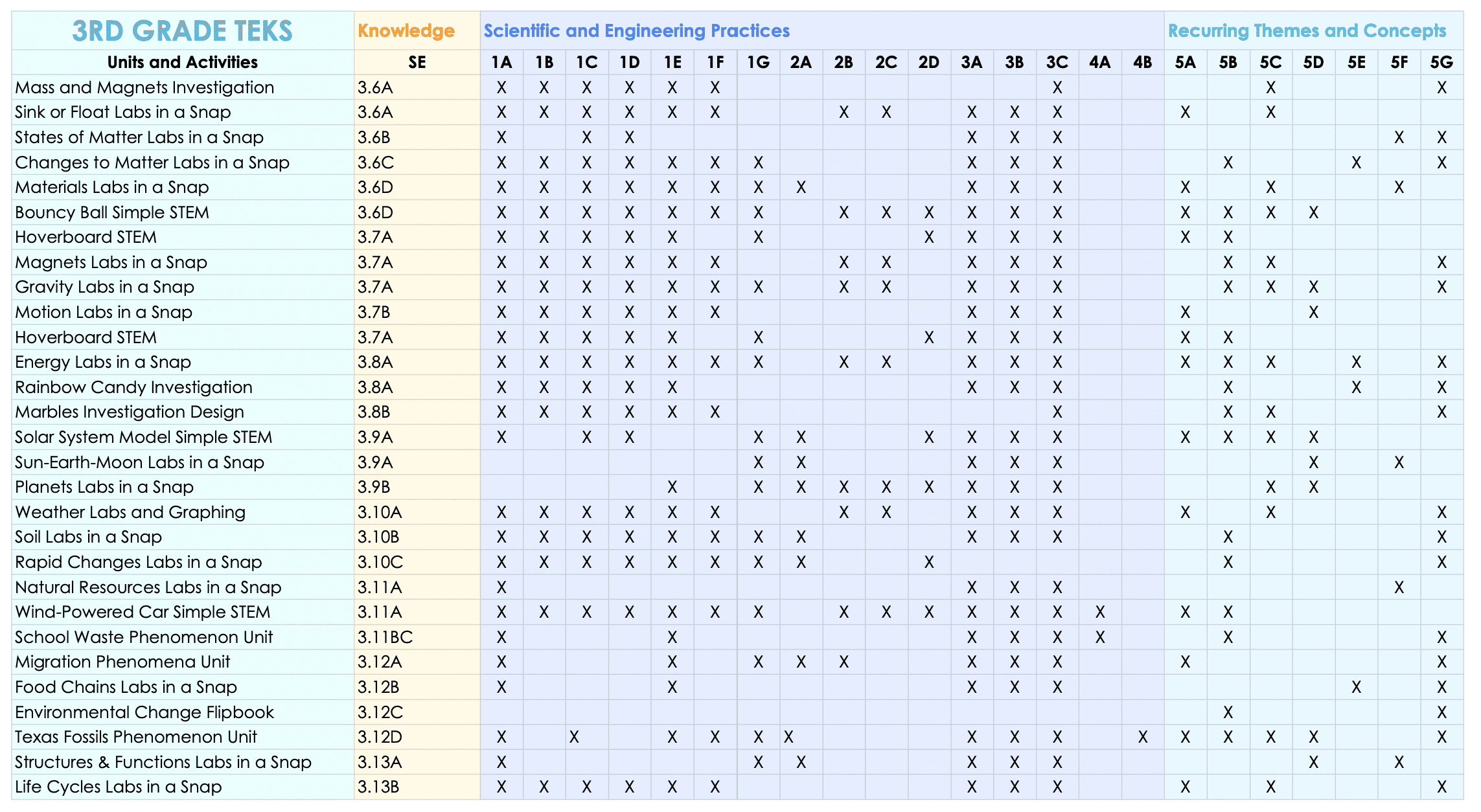
4th Grade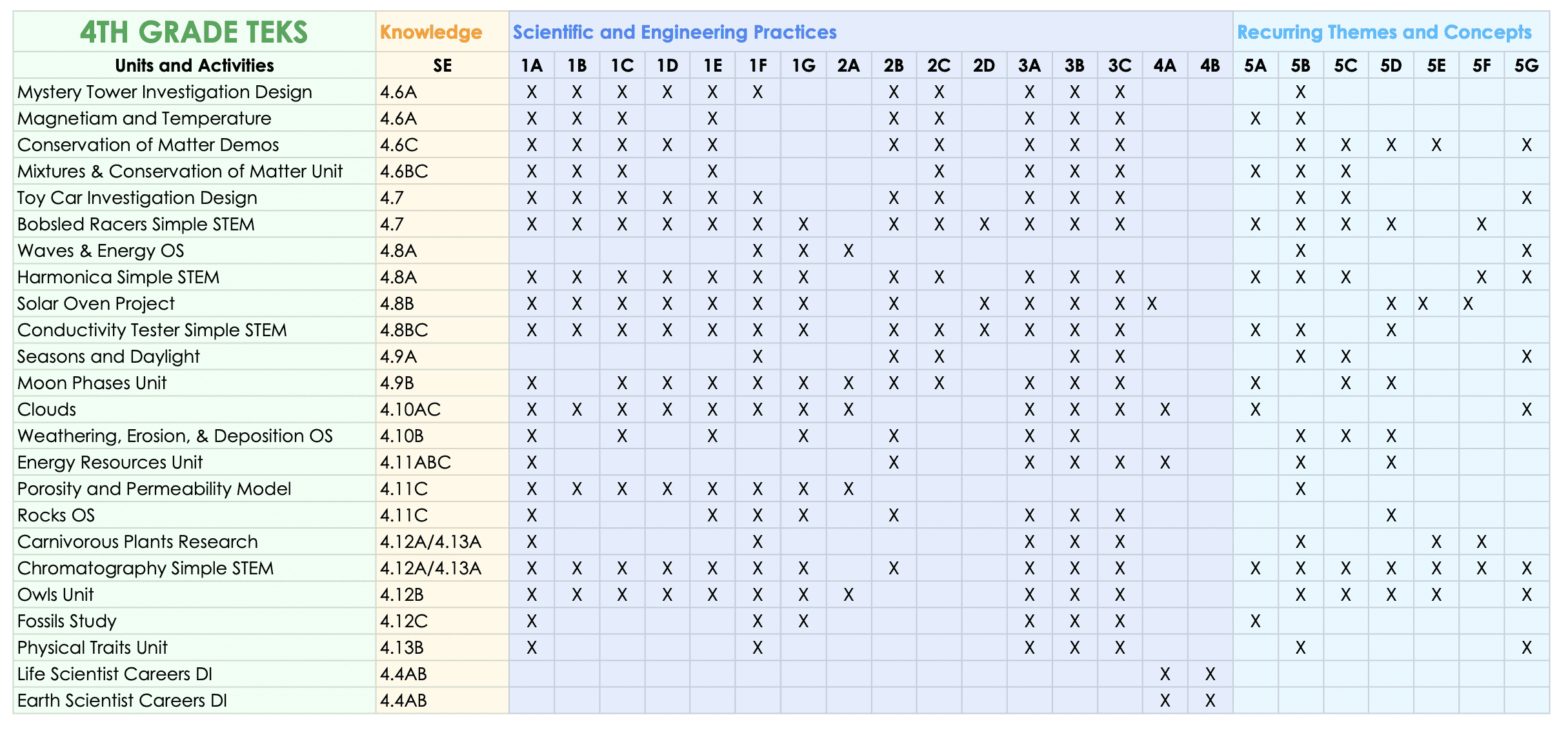
5th Grade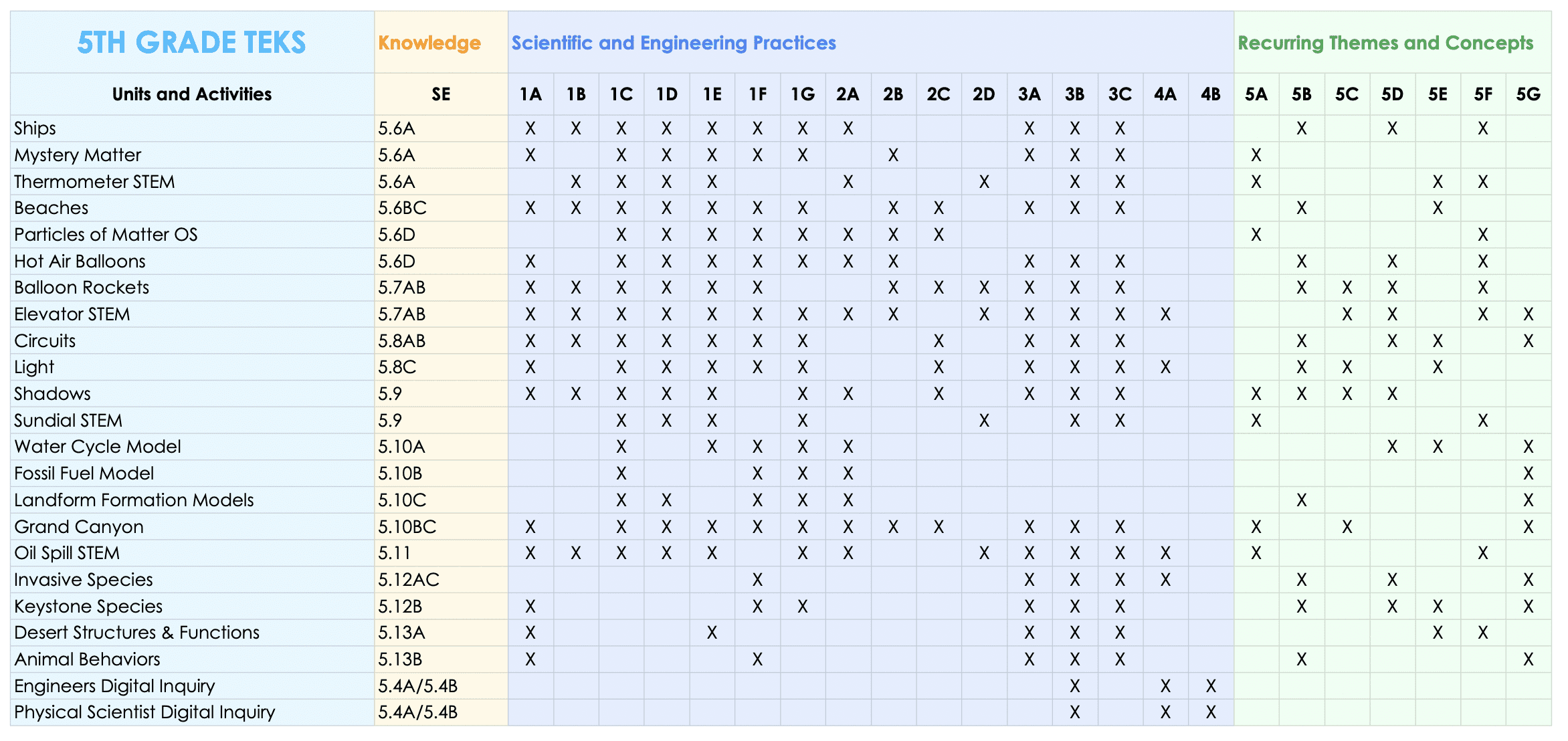
How has Science Penguin changed ?
Assessments
First up, let’s look at assessment updates.
3rd, 4th, and 5th Grade Vocabulary Quizzes:
- 10-question quizzes to test recall and application of terms for each SE
- Provided in printable PDF format and Google Forms
Updated Vocabulary Quizzes for 3rd-5th
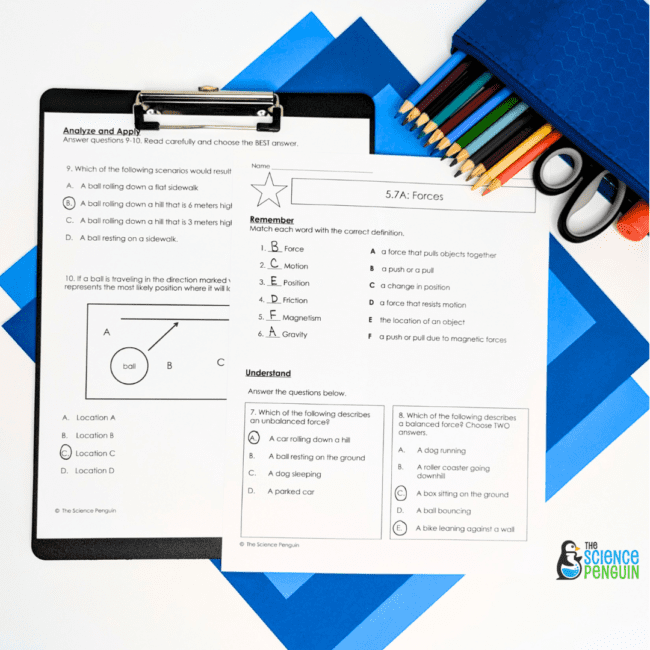
3rd, 4th, and 5th Grade TEKS-Based Assessments:
- 4-question tests to ensure student understanding of each SE
- Provided in printable PDF format and Google Forms
- New printable Study Guides for each SE to help students learn key concepts
New Study Guides for 3rd-5th (included with TEKS-based Assessments)
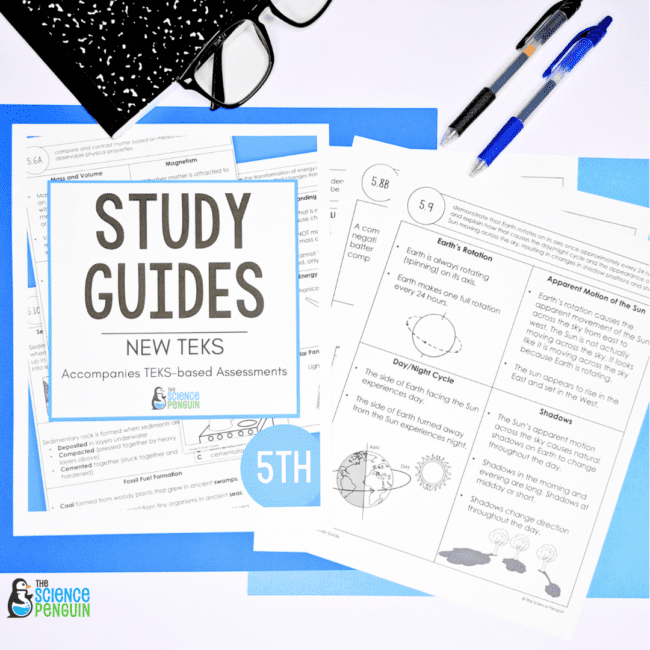
Updated TEKS-based Assessments for 3rd-5th
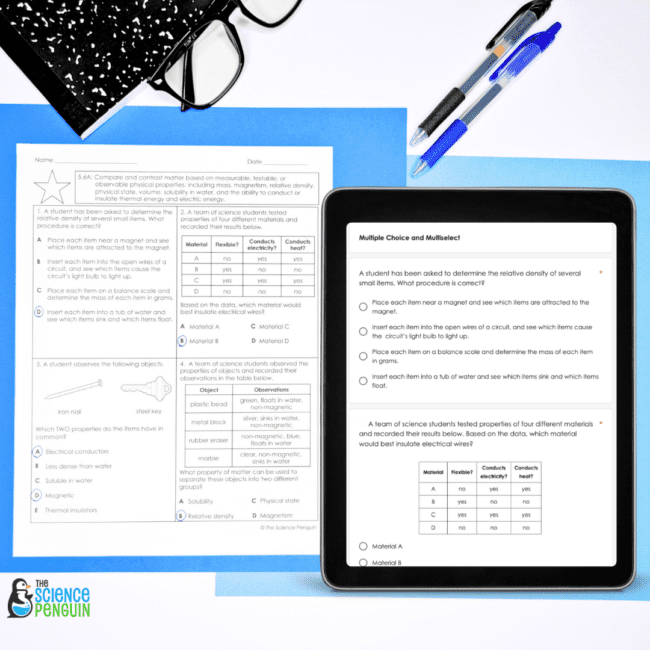
Additional Updated Assessments for 5th Grade TEKS
For the 5th grade TEKS, we added Short Constructed Response activities and updated our Readiness Benchmarks for alignment.
Short Constructed Response for 5th Grade TEKS
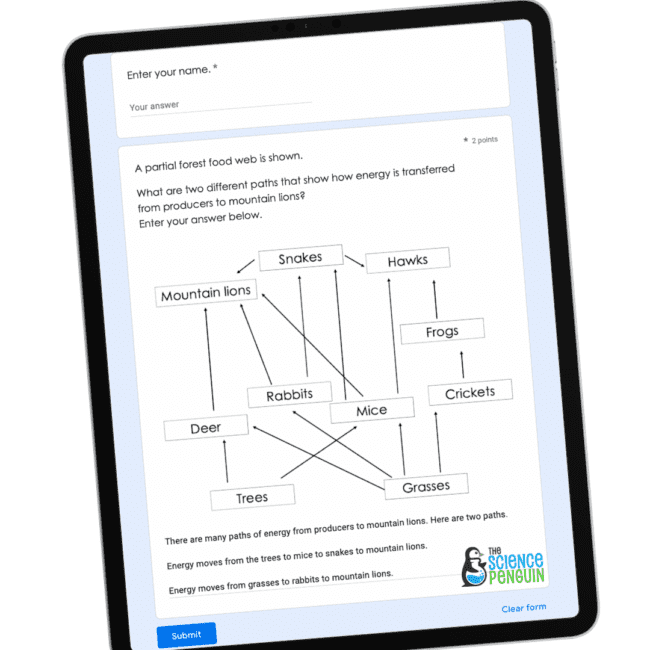
Beginning of Year, Middle of Year, and End of Year Readiness Benchmarks for 5th Grade
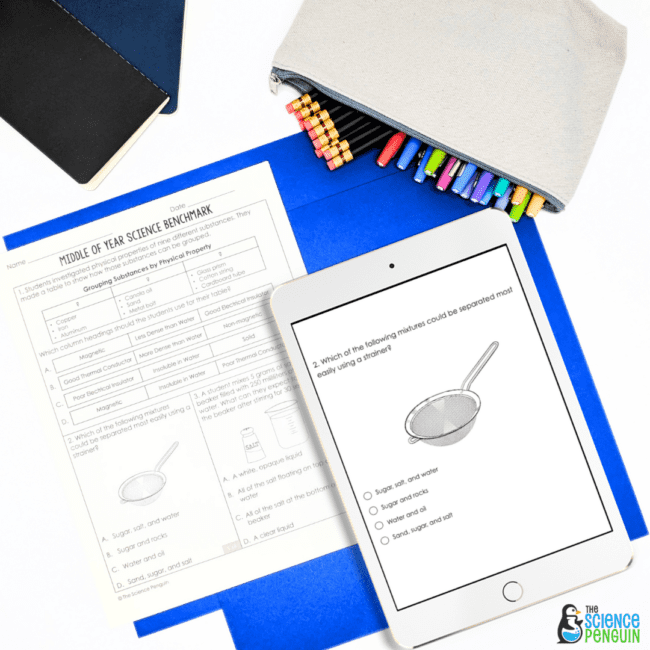
The assessments are just the beginning. Here’s what else we designed explicitly for the new science TEKS.
Phenomena-based Science Units
3rd Grade:
We designed five units focusing on seasonal migrations, speed, magnets, Texas fossils, and conservation at school.
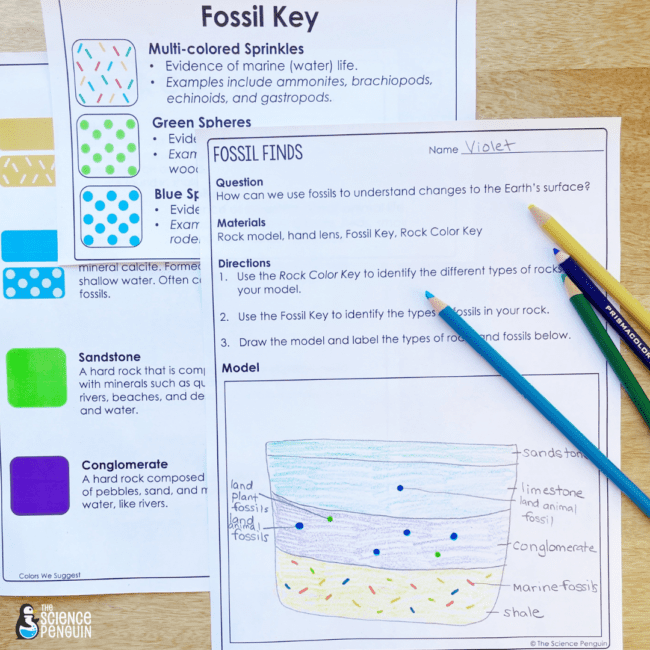
4th Grade:
We have ten phenomena-based units to make up the bulk of instruction for the year. Topics include mystery matter, magnetism, food mixtures, toy cars, energy resources, clouds, moon phases, owl pellets, carnivorous plants, and physical traits.

5th Grade:
We have thirteen phenomena-based units focusing on hot air balloons, mystery matter, ships, beaches, optical illusions, balloon rockets, circuits, shadows, the Grand Canyon, keystone species, desert life, invasive species, and animal behaviors.
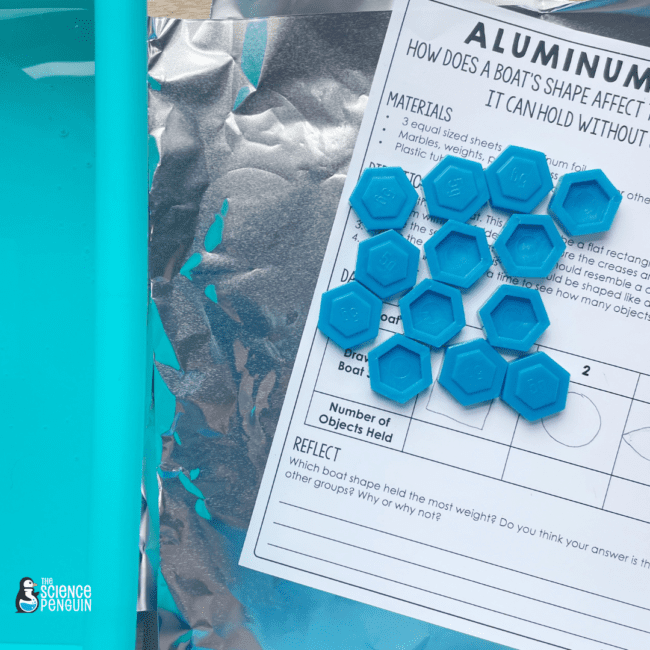
Simple STEM
3rd Grade:
Learn about engineering and design by building a model of the Sun-Earth-Moon system, a wind-powered car, and a hoverboard and redesigning a bouncy ball.
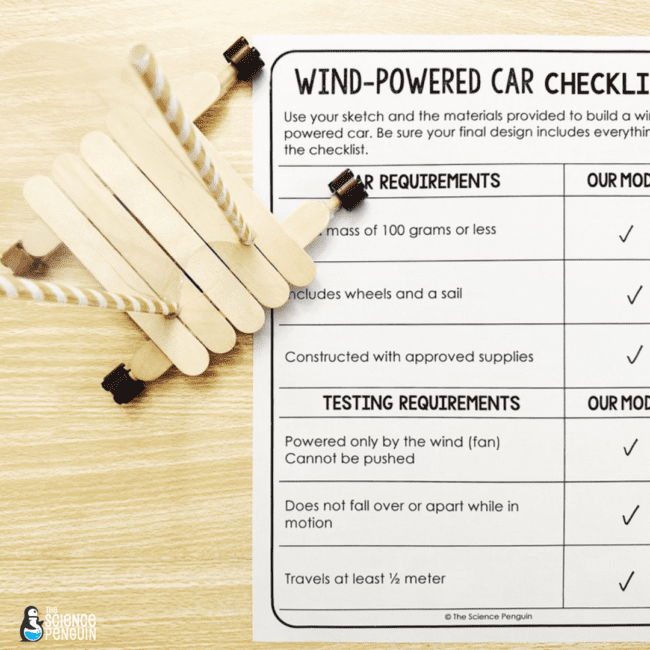
4th Grade:
Build an electrical conductivity tester, harmonica, and bobsled and explore leaf chromatography.
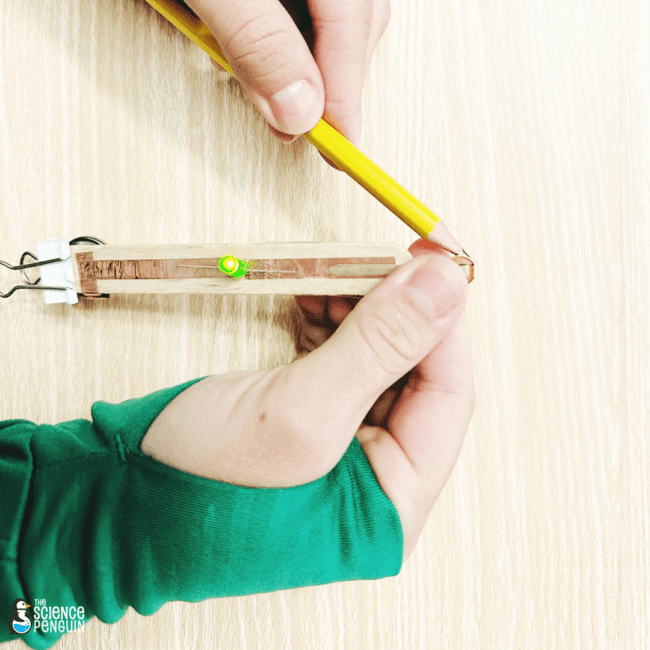
5th Grade:
Build a working thermometer and sundial, design an elevator, and clean up an oil spill.
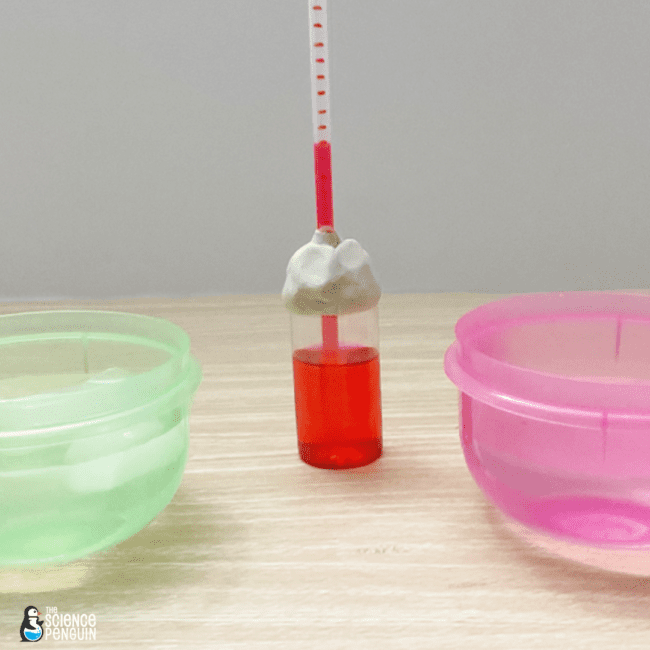
Hands-on Learning
In addition to phenomena-based units and Simple STEM, 3rd graders will conduct hands-on investigations with Labs in a Snap.
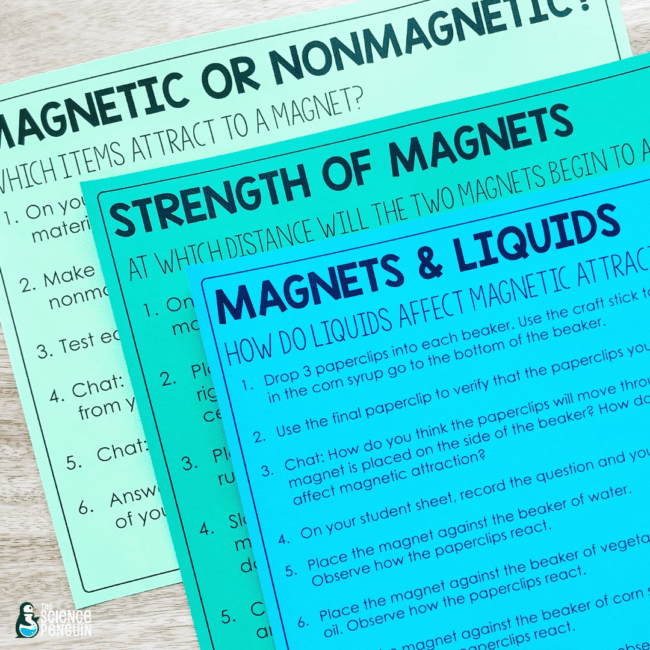
4th and 5th graders will use our new Model resources and updated Observation Stations.
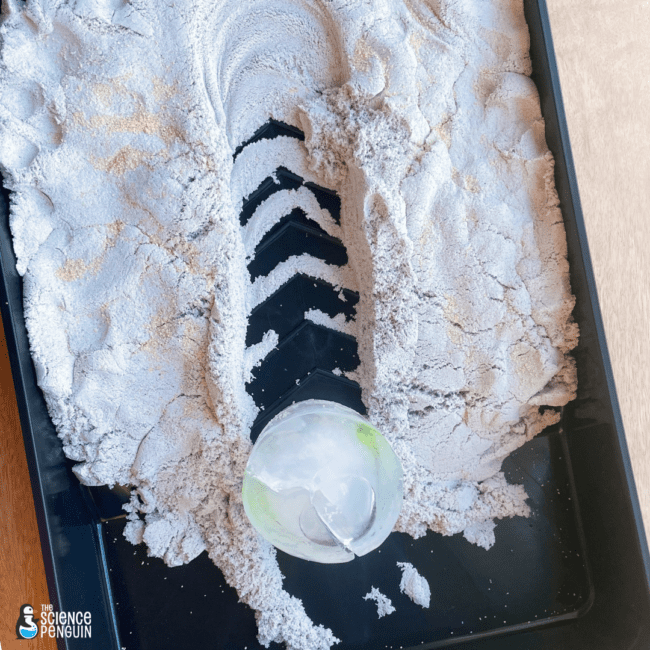
Science Penguin Favorites
You can still use these much-loved Science Penguin resources. We made any changes needed for alignment, so enjoy your favorites!
Spiral Review for 3rd-5th
Start each day with the Spiral Review. Texas teachers swear by this resource!
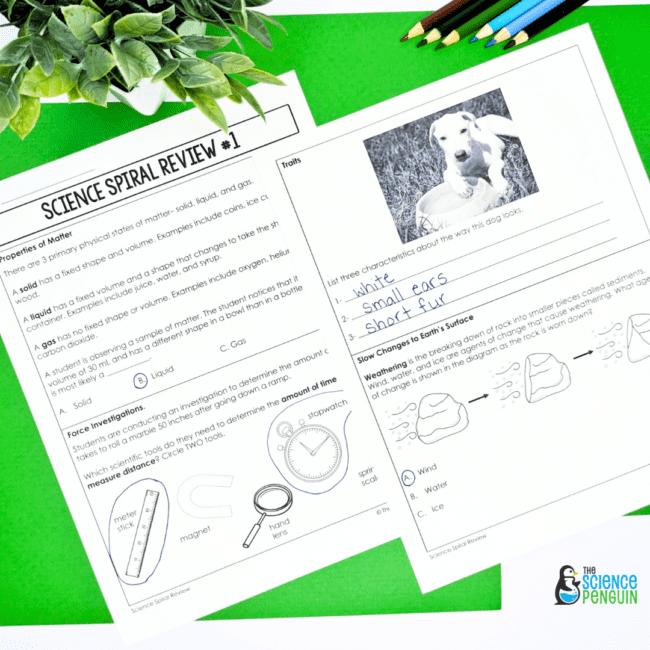
Notebook Templates for 3rd-5th
We recommend maintaining those notebooks with key ideas, vocabulary, and a record of learning.
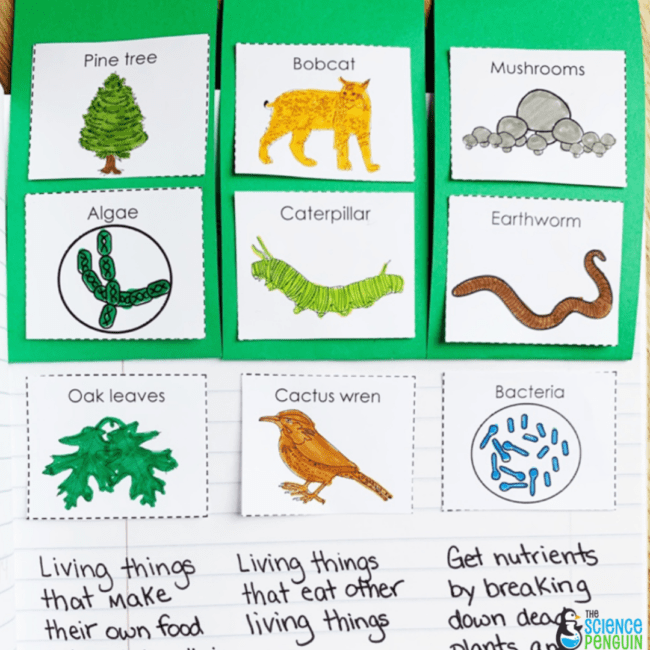
Stations for 4th and 5th
Use Science Weekly 5 centers in 4th grade and Science Stations in 5th grade to review important concepts.
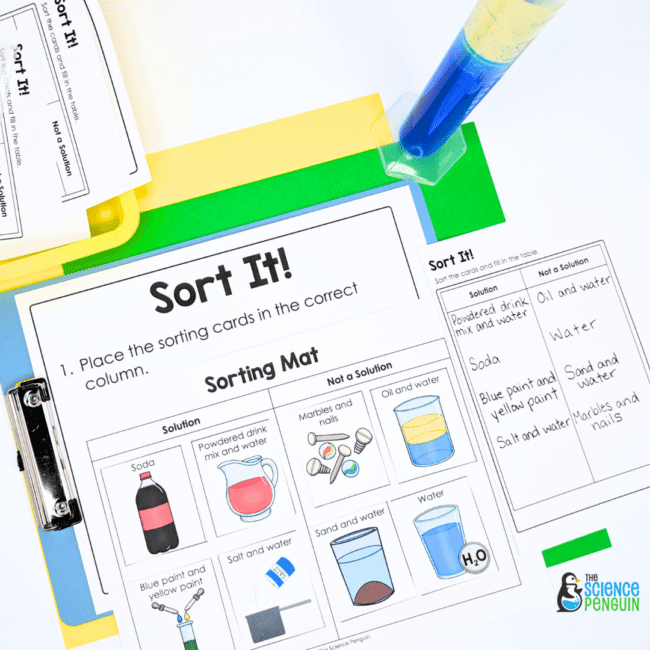
Slides and Notes for 3rd-5th
Teach the main points of each unit with no prep slides and differentiated printable notes. (Slides and Notes are a BRAND NEW addition for 3rd grade!)
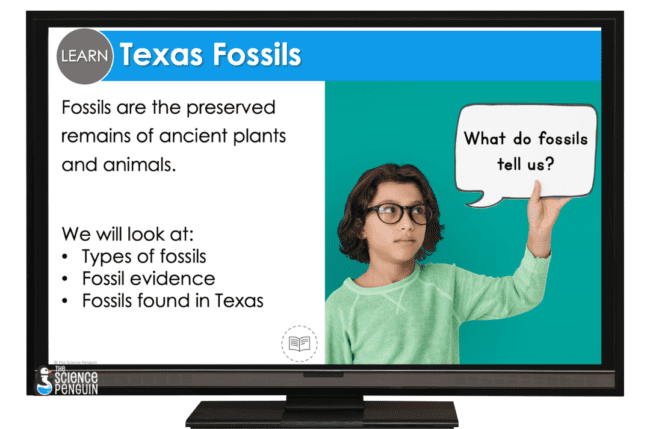
Task Cards for 3rd-5th
Use simple task cards for 3rd grade, vocabulary task cards for 4th grade, and challenging test prep task cards in 5th grade.
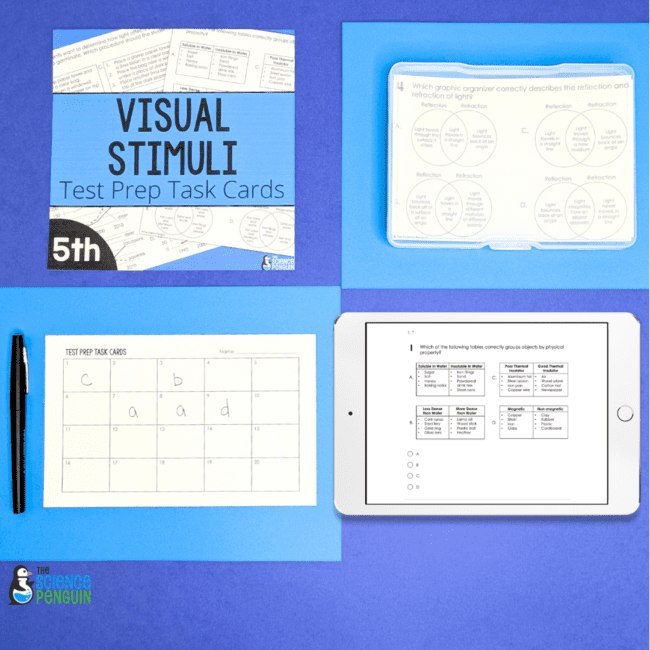
Science Articles for 3rd-5th
Teach ELAR TEKS and Science TEKS together. Go in-depth with high-interest topics while reviewing key ELA skills.
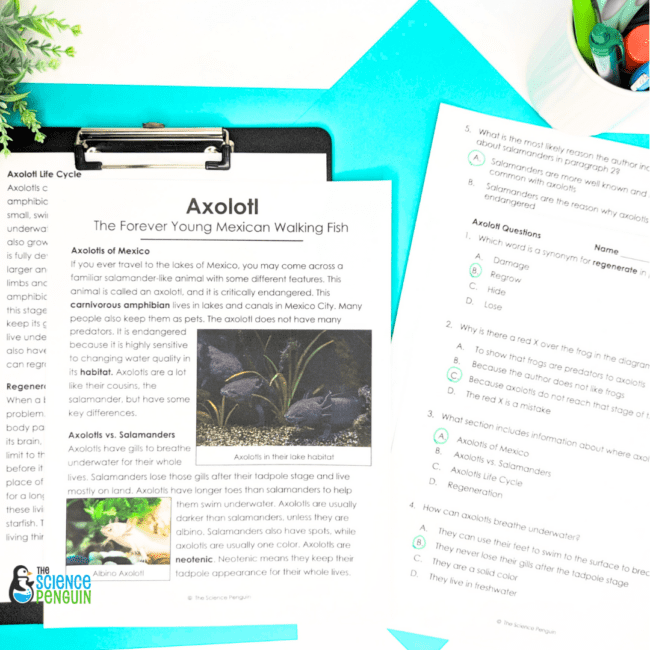
Digital Activities for 3rd-5th
Have fun with Digital Inquiry Jr. in 3rd grade.
Dig deep with Digital Inquiry in 4th and 5th grades.
Learn key vocabulary with Digital Vocab Lessons in 3rd and 4th grades.
Challenge advanced students with Digital Choice Menus.
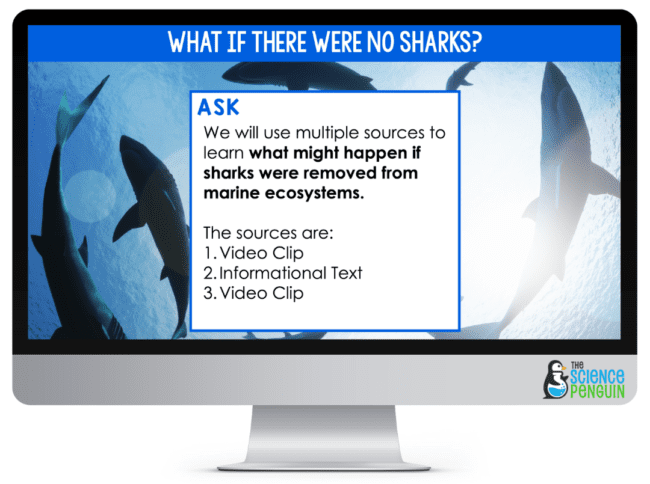
Free Planning Guides
Want to see how we put it all together? Download your new Full Year Planning Guide for each grade level. Sign up below!
What Now ?
What’s next for teaching using the updated science TEKS? We must be intentional when we incorporate the SEPs and RTCs. We can’t treat them as an afterthought. RTCs and SEPs are just as important when planning as the content SE.
Luckily, The Science Penguin is not new to the changes. We incorporated phenomena and engineering into our work with NGSS, and used that knowledge and experience to prepare new resources for the updated TEKS. These resources are tested and loved by teachers across the country. Designing with the TEKS in mind has been a seamless (and fun) transition. 👍
We prepared NEW free planning guides and add A LOT of new phenomena-based units incorporating the SEPs and focusing on the RTCs. (Hello, again, new acronym friends!)
We mapped out the units with the RTCs and SEPs recorded to ensure full implementation.
New TEKS implementation begins August 2024!
Let’s get started!
The transition year is here so you can get your new and updated resources in June 2024. Score! ⭐️
Example 1: Let’s say you purchased a TEKS Spiral Review on TPT in 2019. Do you get the updated version? YES! You will need to login to your TPT account to download the update in the summer 2024.
Example 2: You bought a full year bundle for yourself on our Thinkific website. Do you get the updated version? YES! (You will get an email about using our shiny new platform with the updated resources in summer 2024.)
Example 3: You bought a full year bundle in 2016 on TPT. Do you get an update? YES! Sign in to your TPT account and re-download in summer 2024.
Example 4: You are totally new to The Science Penguin but want to get started with a full year bundle. Pick your bundle here.
Example 5: You want to get the updated TEKS-based assessments for the first time. You can purchase resources individually on TPT.
School Subscriptions: Schools on our subscription plan must update their yearly subscription to continue using Science Penguin resources and access new material. Learn about school subscriptions.
If you sign up with your grade level below, I’ll email you with information for this year AND let you know when updates are ready!
Sign up!
Let me know what grade you teach and I’ll send you an entire year of day-by-day TEKS-aligned lesson ideas that accompany Science Penguin resources!
BONUS: I’ll send you the NEW plans this summer!
Please use your personal email so your guide doesn’t get stuck in a district filter.
3rd Grade
4th Grade
5th Grade
Questions and Answers
I asked teachers in the Science Penguin Huddle group what questions they had about the new science TEKS. Here’s a little Q&A.
There is a lag between implementation and testing new concepts to allow teachers and students to adapt. In 2025, 5th-grade students will be tested on concepts common to both the old TEKS and new TEKS.
The new TEKS are much more similar to the Next Generation Science Standards. Some things that were taught in other states are now in Texas too!
Texas is catching up with other states that have already adopted standards based on scientific practices and reasoning and adding engineering design.
Engineering and evidence-based inquiry are at the forefront of the new standards. Overarching themes will appear again and again as students work through the new TEKS K-12.
I’ll keep it brief. I like the changes. Teaching with phenomena, inquiry, and engineering in mind will require a shift, but I think teachers are going to love it!
I wish there were fewer content standards by grade. It’s hard to go as in-depth as needed with that many SEs. When working through a scope and sequence, I combined related SEs to provide so we can dive a little deeper.
The new TEKS call for scientific practices and engineering. This includes:
- ask questions and define problems based on observations or information from text, phenomena, models, or investigations
- use scientific practices to plan and conduct descriptive and simple experimental investigations and use engineering practices to design solutions to problems
We mapped out the units for 3rd, 4th, and 5th with the RTCs and SEPs recorded to ensure full implementation.
The 4th-grade and 5th-grade bundles have significant updates with phenomena-based and engineering units that make up about 50% of instruction. The rest of the instructional time is spent on Digital Inquiries, stations, slides & notes, task cards, notebooks, small group lessons, and other resources you already know and love.
For 3rd grade, we added engineering components and 3 phenomena-based units for additional inquiry opportunities in addition to the labs-based curriculum we already provide. We also added teaching slides for each of the content TEKS to ensure that students learn the full extent of the content expected.
